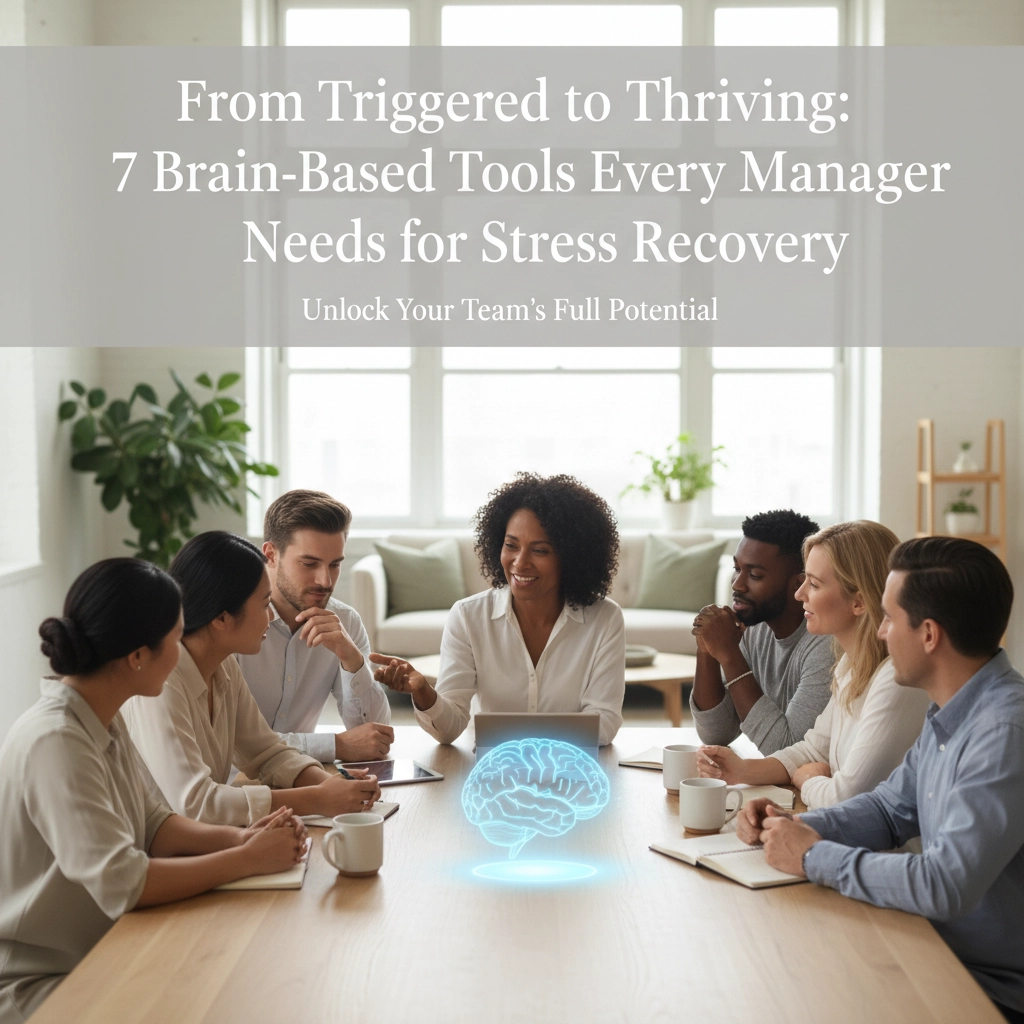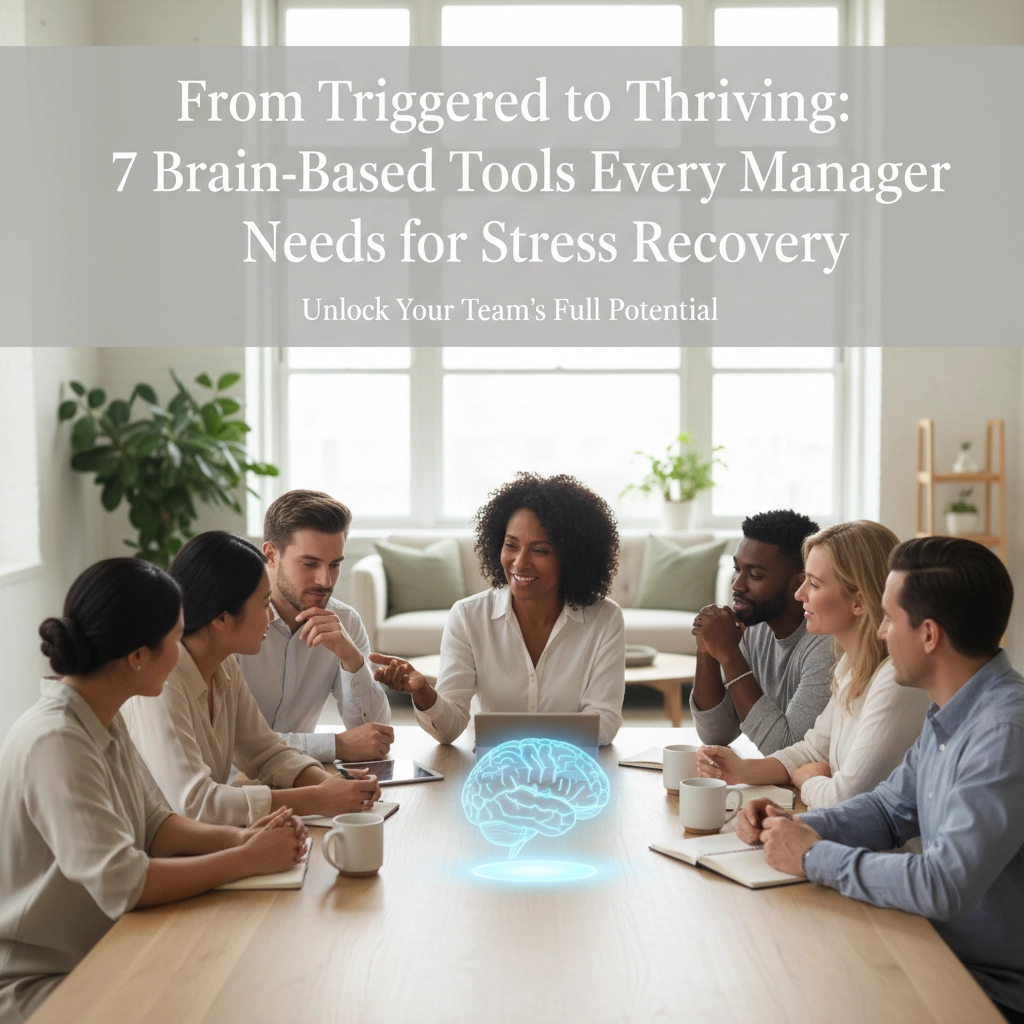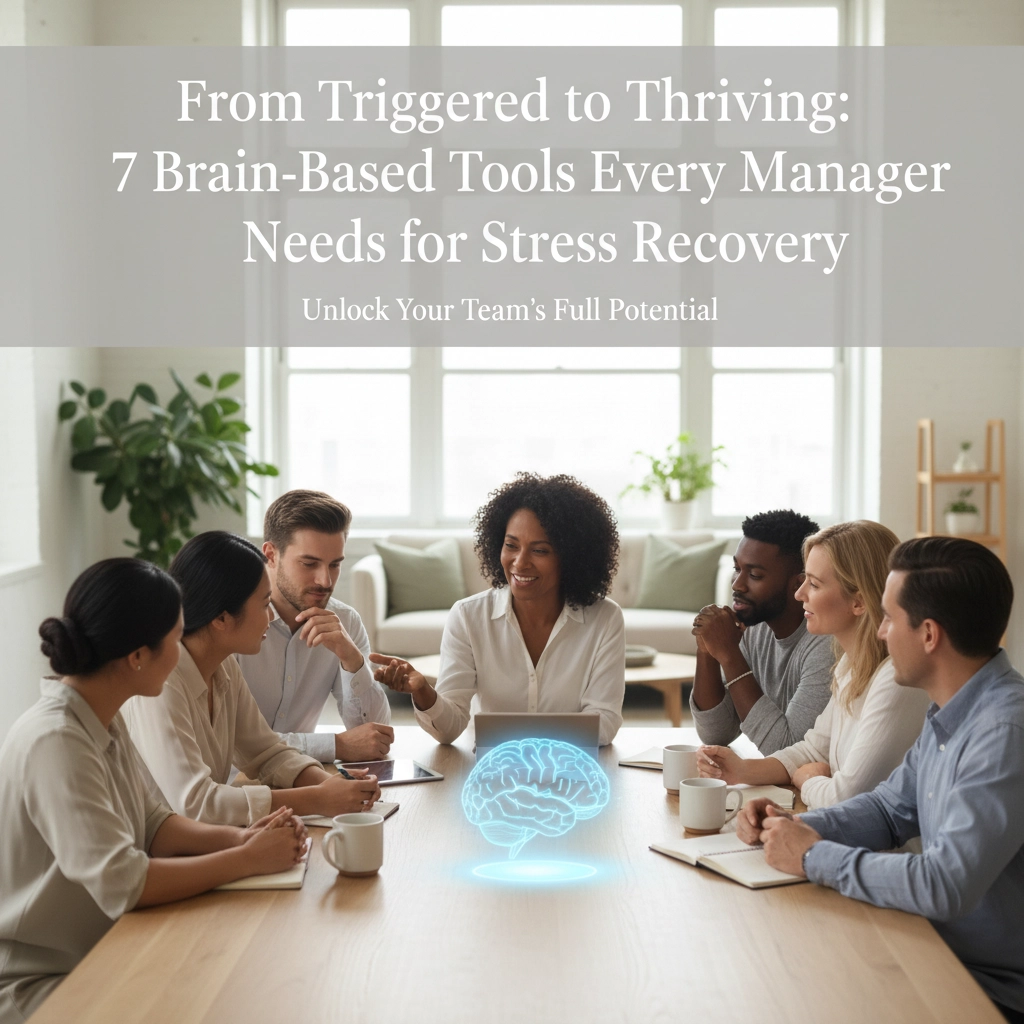From Triggered to Thriving: 7 Brain-Based Tools Every Manager Needs for Stress Recovery

Look, let's get real about something most leadership books won't tell you: your triggered brain is costing your team more than you think. When you're in that hijacked state: heart racing, thoughts spiraling, making decisions from a place of stress: you're not just affecting yourself. You're impacting every relationship, every decision, and every opportunity for your team to thrive.
This is where the concept of Return on Relationships (ROR) becomes crucial. Your ability to manage stress and recover from triggers directly correlates to the quality of connections you build, the clarity of communication you maintain, and the sound decisions you make. When managers master stress recovery, teams don't just perform better: they genuinely connect better.
Here's what I've learned after years of working with leaders who've been stuck in reactive cycles: your brain is either working for you or against you. There's no neutral ground. But here's the good news: neuroscience has given us specific, actionable tools that actually rewire how we respond to stress. Not fluffy concepts, but brain-based strategies that work.
Why Your Triggered Brain Sabotages Team Success
When stress hits, your brain essentially goes offline. The prefrontal cortex: your decision-making center: gets hijacked by the amygdala, that ancient alarm system. In this state, you lose access to your intelligence, creativity, and ability to read the room. Your ROR plummets because you're operating from survival mode, not leadership mode.
I've seen this play out countless times. A manager gets triggered by a challenging team member, makes a snap judgment, and damages trust that took months to build. Or they're so stressed about deadlines that they miss the subtle signs that someone on their team is struggling. These moments don't just pass: they compound.

The 7 Brain-Based Tools That Change Everything
1. The 4-Step State-Shifting Practice
This isn't about positive thinking: it's about neurological recovery. When you feel that trigger coming on, you need to interrupt the stress cascade before it takes over.
Step one: Pause and breathe deeply for four counts. Step two: Notice what's happening in your body without judgment. Step three: Name the trigger without the story. Step four: Choose your response from a centered place.
This practice literally shifts your brain from reactive to responsive mode. It takes about 90 seconds for the chemical flood of emotions to clear your system, but only if you don't keep feeding it with reactive thoughts.
2. Cognitive Behavioral Therapy Techniques for Real-Time Relief
CBT isn't just for therapy sessions: it's for Tuesday afternoon when your biggest client is losing their mind and your team is looking to you for direction. The key is cognitive reframing in the moment.
Instead of "This is a disaster," try "This is information I can work with." Instead of "They're attacking me personally," try "They're expressing frustration about the situation." These micro-shifts in thinking create macro-changes in your stress response and improve your ROR by keeping you connected to what's actually happening versus what your triggered brain is making it mean.
3. The N.E.T.S.™ Model for Brain Health
Based on current neuroscience, this model focuses on four key activities: Novelty, Exercise, Thinking, and Socializing. When managers consistently engage in these four areas, they build resilience that prevents triggers from derailing them.
Novelty keeps your brain plastic and adaptable. Exercise literally grows new brain cells. Thinking challenges like strategic planning strengthen cognitive flexibility. Socializing: genuine connection with your team: builds the psychological safety that makes everything else work.

4. Trigger Pattern Recognition
You can't manage what you can't see. Most managers are blind to their own trigger patterns until someone points them out: usually after damage is done.
Start tracking your triggers like data. What situations consistently set you off? What time of day are you most vulnerable? Who pushes your buttons and why? This isn't about judgment: it's about intelligence. When you recognize your patterns, you can prepare for them and respond differently.
5. Cognitive and Somatic Integration
Here's what most leadership training misses: trauma and stress live in your body, not just your thoughts. You can think your way through a trigger, but if your nervous system is still activated, you're still compromised.
This tool combines cognitive reframing with body-based practices. When you feel triggered, don't just change your thoughts: change your physiology. Adjust your posture, slow your breathing, release tension in your shoulders. Your brain takes cues from your body about whether you're safe or under threat.
6. Mindful Breathing and Grounding
This isn't meditation: this is emergency stress management. When your fight-or-flight system kicks in, controlled breathing is the fastest way to signal safety to your brain.
Try box breathing: inhale for four counts, hold for four, exhale for four, hold for four. Do this for two minutes and watch how your mental clarity returns. Grounding techniques: feeling your feet on the floor, naming five things you can see: bring you back to the present moment where actual leadership happens.

7. Neuroplasticity-Based Recovery Methods
Your brain's ability to rewire itself doesn't stop at childhood. Every time you choose a different response to a trigger, you're literally building new neural pathways. The goal isn't to never get triggered: it's to recover faster and learn from each experience.
Practice visualization where you see yourself responding calmly to typical trigger situations. Your brain rehearses these new responses, making them more available when you need them. This is how you move from reactive management to intentional leadership.
How These Tools Transform Your Return on Relationships
When you master stress recovery, something incredible happens to your ROR. Your team starts trusting you more because you're predictable in your responses. Communication improves because you're actually present in conversations instead of managing internal chaos. Decision-making gets clearer because you're accessing your full cognitive capacity.
Recognition becomes more accurate too. When you're not triggered, you can see your team members clearly: their strengths, their struggles, their contributions. You stop projecting your stress onto their behavior and start seeing what's actually there.

Making It Practical: Implementation That Actually Works
Here's the truth about implementing these tools: you won't remember them when you need them most: unless you practice when you don't need them. This is like building muscle memory for stress recovery.
Start with just one tool and use it daily for two weeks. I recommend the 4-Step State-Shifting Practice because it's simple and immediately effective. Once that becomes automatic, add another tool.
Create environmental cues that remind you to use these techniques. Put a note on your computer screen. Set phone reminders. Ask a trusted team member to give you feedback when they notice you're triggered.
The goal isn't perfection: it's progress. Each time you use these tools, you're building resilience not just for yourself, but for your entire team.
The Ripple Effect of Recovered Leadership
When managers learn to move from triggered to thriving, teams follow. Psychological safety increases. Innovation happens because people aren't walking on eggshells. Problems get solved faster because everyone's brain power is online and collaborative.
Your ROR doesn't just improve with individual team members: it transforms your entire organizational culture. Teams led by managers who've mastered stress recovery consistently outperform teams led by reactive managers. It's not even close.
This work isn't optional anymore. In today's high-stress, fast-changing business environment, your ability to recover from triggers isn't just a nice-to-have leadership skill: it's essential infrastructure for team success.
Ready to transform how you and your team handle stress? The brain-based tools are here. The question is: are you ready to use them?

